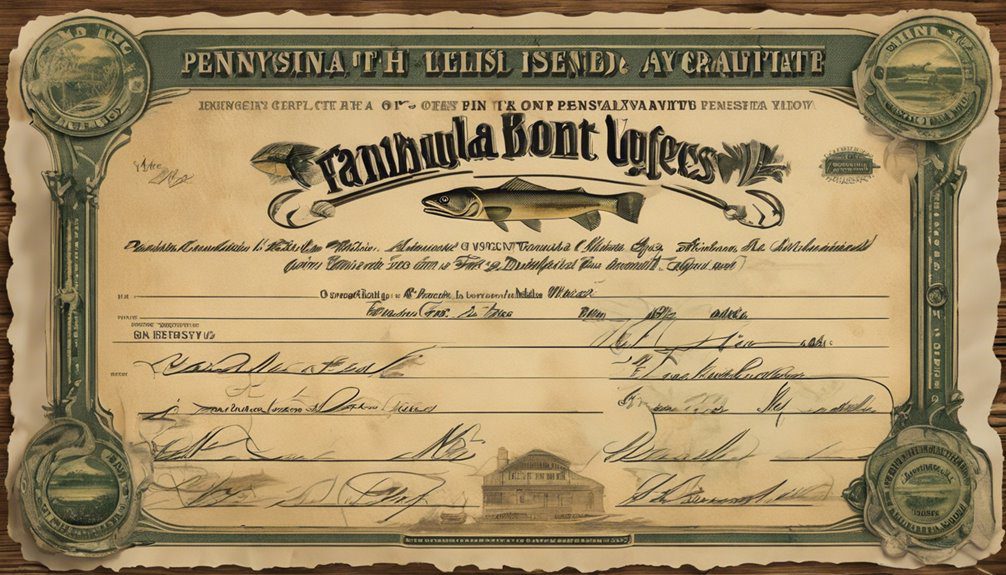If you're considering becoming a Pennsylvania fishing license agent, you might want to understand the role of the Fishing License Agent Bond. This bond not only protects the state and its residents but also establishes your credibility as an agent. Knowing the requirements and steps to obtain this bond can make a significant difference in your journey. But what happens if you violate the bond's terms, and how does it affect your standing? Exploring these implications can provide valuable insights into your responsibilities and the benefits that come with being an agent.
Overview of the Fishing License Agent Bond

The Fishing License Agent Bond acts as a safeguard for both the state and the public, ensuring that agents adhere to regulations while selling fishing licenses. This bond is a legal agreement between you, the agent, and the state, requiring you to comply with the rules governing the sale of fishing licenses. It serves to protect the interests of both the state and the customers you serve.
When you become a fishing license agent, you'll need to secure this bond as part of the licensing process. It demonstrates your commitment to ethical practices and compliance with state laws.
If you fail to meet these obligations, the bond can provide a financial remedy for any damages or losses incurred by the state or the public due to your actions.
The bond amount typically varies based on state requirements, so it's crucial to understand your specific obligations. By obtaining this bond, you're not only fulfilling a legal requirement but also building trust with your customers.
It shows you're serious about your role and willing to take responsibility for your actions, which can enhance your credibility as a fishing license agent. Additionally, understanding the purpose of surety bonds is essential for ensuring compliance with relevant regulations.
Purpose of the Bond
A fishing license agent bond serves a critical role in maintaining integrity within the licensing process. When you act as a fishing license agent, you're responsible for selling licenses and ensuring that funds are properly handled. This bond protects the interests of both the state and the public by guaranteeing that you'll adhere to relevant laws and regulations.
If you fail to meet your obligations, the bond provides a financial safety net. It ensures that funds collected from license sales are appropriately managed and can be recovered in case of misconduct or mismanagement. This means that if you engage in fraudulent activities or fail to remit funds, the bond compensates the affected parties, which helps maintain trust in the system.
Additionally, having this bond showcases your commitment to ethical practices. It can enhance your credibility as an agent and reassure customers that you're compliant with state regulations.
In essence, the bond isn't just a requirement; it's a vital tool for fostering accountability and protecting the interests of all stakeholders in Pennsylvania's fishing license process. So, as an agent, you'll want to prioritize securing this bond to fulfill your responsibilities effectively.
Eligibility Requirements for Agents

To become a fishing license agent in Pennsylvania, you must meet specific eligibility requirements that ensure you can responsibly manage the sale of licenses and handle funds appropriately.
First, you need to be at least 18 years old and a resident of Pennsylvania. This ensures that agents have a vested interest in local fishing regulations and practices.
Next, you should possess a valid Pennsylvania identification or driver's license. This documentation helps verify your identity and residency.
Additionally, you mustn't have any felony convictions related to theft or fraud, as these could disqualify you from handling financial transactions.
It's also crucial that you demonstrate a good understanding of Pennsylvania's fishing laws and regulations. This knowledge ensures you can provide accurate information to customers and promote responsible fishing practices.
Steps to Obtain the Bond
Obtaining the bond required to become a fishing license agent in Pennsylvania involves several clear steps.
First, you need to gather all necessary documentation. This typically includes your application for a fishing license agent and any personal identification required by the state.
Next, you'll want to connect with a surety company. Research different providers to find one that suits your needs.
Once you've selected a company, fill out their application form. Be prepared to provide details about your business and financial background, as this information helps them assess your eligibility for the bond.
After submitting your application, the surety company will evaluate it. They may request additional documentation or information during this process.
Once approved, you'll receive a quote for the bond premium. Review the terms carefully to ensure you understand your obligations. Additionally, it's important to consider the importance of timely renewal to maintain compliance with state regulations.
Cost of the Bond

When considering the cost of the Pennsylvania fishing license agent bond, you'll find that it varies based on several factors. One of the main determinants is your credit score. If you have a strong credit history, you'll likely pay a lower premium. Conversely, a lower credit score may lead to higher costs because it signals more risk to the surety company.
Another factor affecting the bond's price is the bond amount itself. Pennsylvania requires fishing license agents to secure bonds that typically range from $5,000 to $50,000, depending on your specific business requirements. A higher bond amount generally means a higher premium.
Additionally, the surety company you choose can influence the cost. Different companies have varying rates and underwriting criteria. It's a good idea to shop around and compare quotes from multiple sureties to find the best deal.
Lastly, any additional factors, such as the length of your business history or the nature of your operations, can also impact the bond's cost. By understanding these elements, you can better anticipate the financial commitment required for obtaining your fishing license agent bond in Pennsylvania. Furthermore, it's important to note that surety bonds, including Illinois Surety Bonds, are essential for ensuring compliance and financial security in various industries.
Duration and Renewal Process
The duration of your Pennsylvania fishing license agent bond typically lasts for one year from the date of issuance. To ensure you maintain compliance, it's crucial to keep track of your bond's expiration date.
A timely renewal process will help you avoid any disruptions in your ability to operate as a fishing license agent. When it's time to renew, you'll need to contact your surety bond provider. They'll guide you through the renewal process, which may involve submitting a renewal application and paying a renewal premium.
It's essential to have all necessary documentation ready to avoid any delays. Most providers will notify you ahead of time about your renewal, but it's a good practice to set reminders for yourself.
If your circumstances change, such as a change in your business structure or financial situation, make sure to inform your surety company, as this may affect your renewal. Once renewed, you'll receive a new bond certificate, which you should keep on file.
Staying proactive about your bond renewal will help you maintain your license and continue your fishing business without any hitches.
Consequences of Bond Violation

Violating your Pennsylvania fishing license agent bond can lead to serious consequences that impact your business operations. When you breach this bond, you risk financial penalties imposed by the state, which can significantly affect your bottom line. Regulators take these violations seriously, and they can lead to investigations that divert your attention from your business activities.
Additionally, your reputation may suffer. Trust is crucial in the fishing license industry, and any violation can damage your credibility with customers and partners alike. If potential clients see that you've violated your bond, they might hesitate to do business with you, fearing similar issues down the line.
Another potential consequence is the loss of your license to operate as an agent. The state can revoke your license if violations persist, effectively shutting down your operations. Reinstating your license can be a lengthy process, causing further financial strain and operational disruptions.
Lastly, violations can lead to legal actions from the bonding company or other stakeholders involved. Not only could you face lawsuits, but you might also incur additional costs related to legal fees and settlements.
It's crucial to understand these risks and maintain compliance with your bond requirements.
Benefits of Being an Agent
Becoming a Pennsylvania fishing license agent offers numerous benefits that can enhance your business and customer relationships.
First, you'll tap into a steady stream of revenue. Selling fishing licenses can provide you with an additional income source, especially during peak seasons when anglers flock to local waters.
Moreover, being an agent can boost your store's visibility. When customers visit you for licenses, they might discover other products or services you offer, leading to increased sales overall.
This connection with the fishing community also helps build trust and loyalty among your customers, as they'll appreciate your role in facilitating their fishing experiences.
Additionally, you'll have the opportunity to engage with a passionate community of anglers. This interaction can lead to valuable networking opportunities and the chance to learn more about fishing, which can enhance your customer service skills.
Resources for Further Information

As you consider becoming a Pennsylvania fishing license agent, it's important to gather all the necessary information to make informed decisions. The Pennsylvania Fish and Boat Commission (PFBC) website is your go-to resource. It offers detailed guidelines on licensing, bonding requirements, and the application process.
You can also find FAQs that address common concerns agents may have. If you prefer direct communication, consider reaching out to the PFBC's customer service. They can provide personalized assistance and answer specific questions you might've about your obligations and benefits as an agent.
Additionally, networking with current agents can be invaluable. Join forums or local fishing clubs where experienced agents share insights and tips. They can inform you about practical aspects of the job that online resources might overlook.
Lastly, check with local government offices for any additional regulations or requirements specific to your area. Staying informed will help you navigate the licensing landscape effectively and ensure you're fully equipped to serve your community. Moreover, understanding the importance of surety bonds will enhance your credibility and trust with clients.
With the right resources, you'll be well on your way to becoming a successful Pennsylvania fishing license agent.
Conclusion
In summary, the Pennsylvania Fishing License Agent Bond is essential for maintaining trust and compliance in the fishing community. By securing this bond, you not only protect yourself and your customers but also contribute to ethical practices in the industry. As an agent, you'll enjoy the benefits of credibility and financial security, ensuring a smooth operation. If you're considering becoming an agent, remember that obtaining this bond is a vital step toward success and responsibility in your role.


